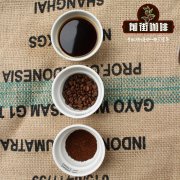The advantages of organic coffee the difference between boutique coffee and organic coffee

Professional coffee knowledge exchange more coffee bean information please follow the coffee workshop (Wechat official account cafe_style)
People's views on organic coffee are very polarized. for successful people, organic production is more helpful to the environment, while for those who oppose organic, it may be mentioned that organic planting is inefficient and the certification process is expensive. and chemical residues can be burned during baking.
Compared with non-organic coffee, organic coffee production may be more labor-intensive and more expensive to produce.
There is no uniform international standard for organic coffee certification. In the case of the United States, the standard for organic coffee is set by the National Organic Program (NOP) of the United States Department of Agriculture. The EU definition of organic coffee is: "all producers, processors or traders who want to sell food under the organic name need to register with the relevant institutions." The operators responsible for verification in these institutions are required to abide by organic rules. Each EU country can decide whether the certification body is public or private, but the relevant authorities will check whether these institutions comply with the EU organic production rules. "many other countries outside the EU have similar standards.
The certification of organic farms is handled by relevant agencies, which usually operate in several producing countries and obtain multiple standard certifications to serve different markets.
There is no uniform international standard for organic coffee certification. In the case of the United States, the standard for organic coffee is set by the National Organic Program (NOP) of the United States Department of Agriculture. The EU definition of organic coffee is: "all producers, processors or traders who want to sell food under the organic name need to register with the relevant institutions." The operators responsible for verification in these institutions are required to abide by organic rules. Each EU country can decide whether the certification body is public or private, but the relevant authorities will check whether these institutions comply with the EU organic production rules. "many other countries outside the EU have similar standards.
The certification of organic farms is handled by relevant agencies, which usually operate in several producing countries and obtain multiple standard certifications to serve different markets.
The Fine Coffee Association SCA defines that a cup score of 100 points is commercial coffee as long as it reaches 60 points but less than 80 points, while it can be called fine coffee if it reaches 80 points. These special coffees are usually grown in specific microclimates and soils, focusing on production and delicate handling.
Important Notice :
前街咖啡 FrontStreet Coffee has moved to new addredd:
FrontStreet Coffee Address: 315,Donghua East Road,GuangZhou
Tel:020 38364473
- Prev

Organic coffee in Vabar, Peru. What is the taste of organic coffee in Peru under the planting conditions?
Professional coffee knowledge exchange more information about coffee beans Please follow the coffee workshop (Wechat official account cafe_style) in recent years, Peruvian coffee has become more and more famous. We've also been looking for good Peruvian beans. This coffee bean has a mild, smooth and complex flavor, with the sweetness and stomach acidity of fresh apricots and the aroma of peanut nuts. When you soak, it is sweet and sweet. And it's still
- Next

Is fine coffee American coffee? What's the difference between boutique coffee and Italian coffee?
Professional coffee knowledge exchange more coffee bean information please follow the coffee workshop (Wechat official account cafe_style) what is boutique coffee? There is a lot of coffee waiting to drink in the world. It can be bought in bags, cans and cans. It can be whole beans or ground, or it can be boiled. It can be drunk at home or outside, provided by people or machines. All these possibilities
Related
- Beginners will see the "Coffee pull flower" guide!
- What is the difference between ice blog purified milk and ordinary milk coffee?
- Why is the Philippines the largest producer of crops in Liberia?
- For coffee extraction, should the fine powder be retained?
- How does extracted espresso fill pressed powder? How much strength does it take to press the powder?
- How to make jasmine cold extract coffee? Is the jasmine + latte good?
- Will this little toy really make the coffee taste better? How does Lily Drip affect coffee extraction?
- Will the action of slapping the filter cup also affect coffee extraction?
- What's the difference between powder-to-water ratio and powder-to-liquid ratio?
- What is the Ethiopian local species? What does it have to do with Heirloom native species?

